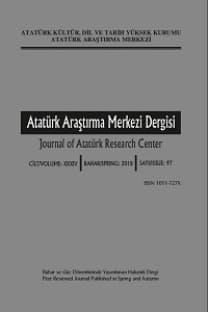Türk Savaş Motivasyonu ve Çanakkale
Yaşamayı sürdürmenin, hayatı idame ettirmenin temellerinden birisi de mücadeledir. Yani bir bakıma kavgadır. Bu temel, fert için de, toplum için de geçerlidir. Bilhassa kendisini millet olma bilincine eriştirmiş toplumlar için daha da elzemdir. Kavga veya mücadeleyi benimseyememiş hiçbir canlı var olma, yaşama imkânına ve hakkına sahip değildir. Bu bizim için topyekün geçmişin ve tarihî olayların gösterdiği kesin bir hükümdür. işte bu hüküm neticesinde yeryüzünde var olma veya kendisini üstün kılma mücadelesi veren kültürler, kavgayı ve onun uç noktası olan savaşı hayatın bir realitesi kabul ederek ona İlmî bir gözle bakmışlar ve hatta bazen bir "sanat” algılamasıyla bakmışlardır.
Anahtar Kelimeler:
Çanakkale Savaşı, Motivasyon, Savaş Psikolojisi
Muslims of British India and The Kemalist Reform in Turkey Iqbal, Jinnah and Atatürk, 1924-1938
Ever since his emergence as the leader of the Turkish nationalists, Kemal Atatürk had attracted wide support from among the Müslim of British India. Though the adulation of Kemal had sprung from the Indian in- volvement with pan-Islam but basically it was his apparent defence of the caliphate which had endeared him to his well-wishers in the Subcontinent. Thus, ali through the exuberance of the Khilafat movement (1918-1924), Mustafa Kemal was lauded for his perceived stand against Western im- perialism in the hour of Islam's grave crisis. Even when the relations between the sultan-caliph at İstanbul and the nationalists at Ankara fell to their lowest ebb, as in Nowember 1922 owing to the separation of the sultanate and the caliphate, no widespread stir w as created in India. The clash came only in March 1924, when Kemal abolished the caliphate which to him had become anomalous and anachronistic. The reaction in India was instantaneous and sharp, but somehow the break was soon repaired. After the initial shock, the Indian public opinion, spearheaded by those who understood the Turkish predicament, began to tilt again in favour of the nationalists and the new situation generally came to be accepted.
Keywords:
British India, United Kingdom Muslims, Atatürk, Turkey,
___
- Keegan, John, Savaş Sanatı Tarihi (A History of Warfare), çev. Füsun Doruker, İstanbul 1995.
- Clausewitz, Cari Von, Harp Üzerine (Wom Krige), çev. H. Fahri Çeliker, Ankara 1991.
- Köymen, Mehmet Altay, Selçuklu Devri Türk Tarihi, Ankara 1993.
- Köymen, M.A., Alp Arslan ve Zamanı, İstanbul 1972.
- ISSN: 1011-727X
- Yayın Aralığı: Yılda 2 Sayı
- Başlangıç: 1984
- Yayıncı: Atatürk Kültür, Dil ve Tarih Yüksek Kurumu Atatürk Araştırma Merkezi
